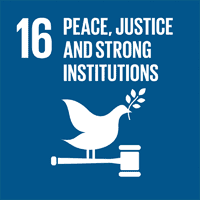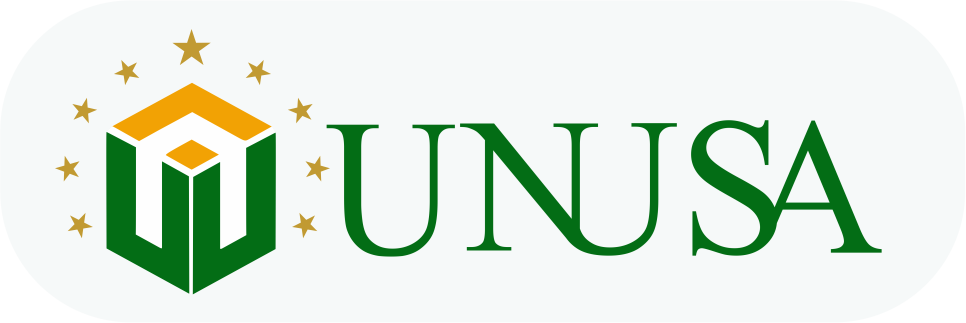16
PERDAMAIAN, KEADILAN DAN KELEMBAGAAN YANG TANGGUH
Menguatkan Masyarakat yang Inklusif dan Damai untuk Pembangunan Berkelanjutan, Menyediakan Akses Keadilan untuk Semua, dan Membangun Kelembagaan yang Efektif, Akuntabel, dan Inklusif di Semua Tingkatan
Peace, Justice, and Strong Institutions

Universitas Nahdlatul Ulama Surabaya (Unusa) is committed to upholding the highest standards of governance, transparency, and collaboration as essential pillars of its role in society. Through inclusive governance practices and strong partnerships with government entities, Unusa fosters an environment of accountability and shared responsibility that aligns closely with SDG 16: Peace, Justice, and Strong Institutions. The university’s governance structures and government partnerships exemplify its dedication to building a sustainable, ethical, and inclusive institution.
Unusa promotes democratic representation by ensuring faculty, staff, and student involvement in decision-making bodies, such as the university senate and advisory boards. This inclusive approach strengthens institutional accountability, fosters a sense of community ownership, and aligns with SDG 16’s focus on creating inclusive and participatory societies. Additionally, Unusa recognizes and supports the vital role of the student union, empowering students to actively participate in shaping university policies and fostering a campus culture of engagement and equity.
To support governance measures, Unusa has developed policies and procedures that enable meaningful engagement with external stakeholders, including local residents, government officials, and civil society representatives. By prioritizing open communication and participatory frameworks, Unusa enhances its ability to address community needs, share knowledge, and collaboratively pursue sustainable development goals. This commitment is further exemplified in Unusa dedication to transparency, particularly through its adherence to rigorous financial audits and its long-standing commitment to academic freedom, which supports a climate of open inquiry and intellectual exploration.
Unusa partnerships with government agencies at various levels further amplify its impact on public policy and sustainable development. The university frequently contributes expert guidance to national and local governments on policy development, with recent collaborations addressing Indonesia’s educational roadmap and supporting sustainable development plans for Yogyakarta Municipality. By working with policymakers to address pressing issues in economics, law, and environmental protection, Unusa provides the tools and knowledge essential for effective governance.
Through its robust governance measures and active government collaborations, Unusa exemplifies its commitment to building strong, transparent institutions and advancing sustainable development within Indonesia. These efforts demonstrate Unusa role as a responsible, engaged institution dedicated to fostering inclusive societies and supporting government objectives in creating a peaceful and just future for all.
Unusa Governance Measures Supporting Inclusive and Transparent Institutions
- Inclusive Representation in Governance
- Recognition of the Student Union
- Strategic Stakeholder Engagement
- Community Partnership Bodies
- Commitment to Ethical Standards
- Academic Freedom Policy
- Financial Transparency
Unusa promotes inclusive governance by ensuring faculty, staff, and student representation within its highest decision-making bodies, including the university senate and board of advisors. This democratic approach supports SDG 16 by fostering accountability and empowering the university community to participate actively in institutional governance.
Unusa formally recognizes and supports its student union, acknowledging the union’s role in fostering an engaged, inclusive campus environment. By enabling student self-governance, UII aligns with SDG 16’s goals for promoting inclusivity and equity within its academic community.
Through a structured engagement framework, Unusa collaborates with external stakeholders, including local residents, government entities, private sector organizations, and civil society. This policy-driven approach promotes inclusivity in decision-making and strengthens Unusa role as a community partner, in line with SDG 16.
Unusa fosters active community partnerships through dedicated units like the Directorate of Research and Community Services. These bodies work to facilitate collaborative relationships with local stakeholders, enhancing mutual knowledge exchange and problem-solving efforts aligned with SDG 16.
Unusa demonstrates strong governance by adhering to ethical standards in all partnerships, supporting transparency and accountability within its institutional operations. This commitment upholds SDG 16’s principles of justice and strong institutions.
Unusa safeguards academic freedom through policies that ensure open inquiry and intellectual independence, essential for fostering a just and inclusive academic environment. This policy, established formally in 2012 but practiced long before, reinforces the university’s dedication to free expression, a core element of SDG 16.
To maintain accountability, Unusa undergoes annual audits conducted per Indonesian accounting standards. This practice reinforces public trust and supports the university’s commitment to transparency, key aspects of SDG 16’s focus on promoting strong, just institutions.
Unusa Engagement with Government to Support Strong and Inclusive Institutions
- Providing Expert Policy Advice
- Capacity Building for Governance
- Policy Focused Research Collaborations
- Facilitating Neutral Dialogues for Political Discourse
Unusa actively collaborates with government bodies at various levels, providing expertise and guidance on policy formulation. By supporting over 25 national, regional, and local governments, Unusa reinforces its commitment to community service and effective governance, aligning with SDG 16’s objective of fostering transparent and accountable institutions.
Through targeted programs aimed at upskilling village heads and other local leaders, Unusa enhances governance capacity within communities. Offering training in key areas like economics, law, and climate change, Unusa helps empower policymakers to address local challenges and promote sustainable development, supporting SDG 16’s goal of building strong institutions at all societal levels.
Unusa is actively involved in evidence-based policymaking through partnerships with both national and local governments. Collaborating with entities like the Ministry of Foreign Affairs and local governments (e.g., Kediri and Banyuasin Regency), UII undertakes policy-focused research that informs and strengthens public governance, in alignment with SDG 16’s commitment to supporting inclusive institutions.
Unusa promotes peaceful and inclusive dialogue through platforms for interfaith and national discourse, inviting politicians and stakeholders to address key societal challenges. By providing a neutral space for open dialogue, Unusa contributes to social cohesion and understanding, supporting SDG 16’s emphasis on peaceful and inclusive societies.
